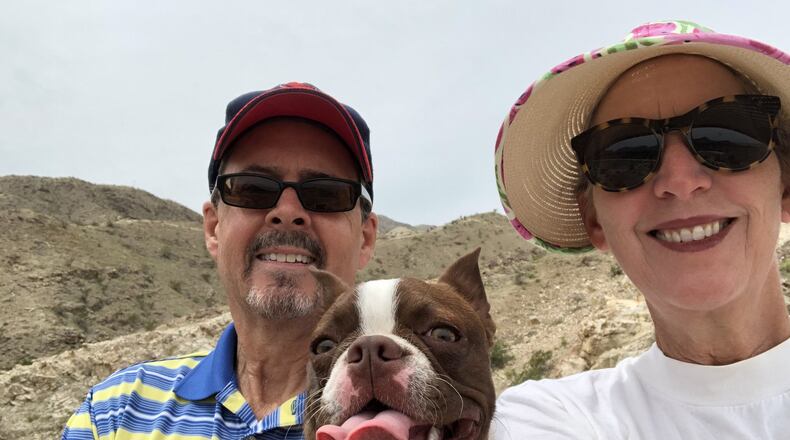At the perfume counter, she bought a scent based on its name alone, Miracle; she now doses herself with a drop of it before going to work to treat patients infected with the coronavirus.
Since August of 2018, Groves has split her time between Springfield, where she spent most of her career and still owns a home, and the Eisenhower Medical Center in Rancho Mirage, Calif.
When COVID-19 appeared there amidst the desert blooms, she felt well-prepared to defend herself.
“I have been ridiculously aware of germs since the surgery rotation of my medical school,” Groves said. “In my entire career, I have never gotten an infection from a patient, nor have I infected my family ever.”
MORE FROM TOM STAFFORD: Former Springfield doctor penned pandemic fiction years ago
But even with the infection protections skills akin of an American Ninja Warrior, Groves had to check the research so she could defend “every square inch of her body.
“(It’s) not just for my own safety at work, but for the safety of the patients, the safety of my colleagues.”
“And it’s not just about gelling or hand-washing,” she said. “It’s also about when to mask and how to unmask,” which varies from mask to mask. It’s (also) about how to get the gown on, how to get the gown off and how to do that without contaminating the masks and the goggles.”
And it’s a process that doesn’t stop when she leaves the hospital.
“I pull in to my garage, which is separate from my house, and I close the garage door. I sanitize my keys, my badge and my phone and lay them on my windshield (dash). Then I take off my clothing and it goes straight in the washer, which is right in the garage.
The final steps in extending her safety streak are particularly dramatic.
“I open the garage door and … run butt-naked that 30 feet into the house.”
MORE FROM TOM STAFFORD: War against coronavirus has collateral blessings
Then it’s straight in the shower, she said, where “all those worries, the anxieties and virus particles that might have spread onto my body despite my hair go down the drain.”
The last comment is not the whole truth.
Because emotions she finds manageable during the day come out at night. Groves’ list of her nighttime jumble of feelings reads like a parody of Snow White’s Seven Dwarfs: “sleepless, anxious, hopeful, inspiring, despairing and exhausted.”
A combination of those may have been at work the day of our first interview, because the next morning Groves sent an email saying we had not made it to the “meaty part” of the discussion.
That involves an aspect of social distancing that, amid the dangers of the virus, she has found intolerable: being apart from her husband, Rob Baker.
Before the virus arrived, trips back and forth to Springfield during her weeks-on weeks-off schedule allowed Groves and Baker, a political science professor at Wittenberg University, to see enough of one another.
“Before it became apparent Wittenberg would be closed, we had more than one discussion about how difficult it was going to be to be apart: The stress of an unprecedented pandemic, the social isolation, and the unthinkable: being seriously ill, either one of us, and alone.”
The other side of the issue involved the risks of being together.
“While I am fairly confident of not bringing the virus home on my body,” Groves said, “we are both realistic about the likelihood that one of us will bring it home in our bodies, and unwittingly infect the other.”
MORE FROM TOM STAFFORD: Protect health care workers so they will be there when we need them
Bottom line?
“We have decided that (the risk of being together) is better than the alternative: “being sick, or worse, dying, alone.”
It’s something both are keenly aware of as Groves braces herself for spending time at the bedsides of COVID-19 patients who may themselves die alone - a cruelty visited on so many patients and their families.
Said Groves, “We each meant it when we said ‘for better or for worse.’”
She knows the two of them are in good company.
“There are millions of people expressing that same humanity around the world, putting their lives on the line to be with, or protect, their loved ones.”
While endorsing social distancing as a mitigating measure, the doctor who underscores the importance of relationships between doctors and patients has faith that deeply human bonds may not be solely a vulnerability in fighting the coronavirus, but a strength.
“When there is no cure,” Groves said, “who can say whether love itself might not mean the difference between life and death?”
It’s a thought as sweet as the scent and the name of her perfume.
(Correction: Last week’s column incorrectly reported that the H1N1 flu originated in China. Researchers concluded that the so-called “swine flu” originated in Mexico.)
About the Author
